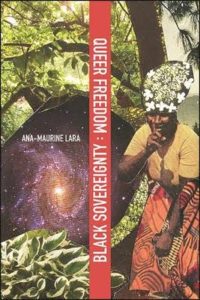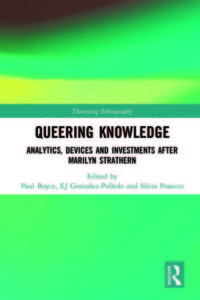The Association for Queer Anthropology (AQA) is pleased to announce the 2020 winners of the Ruth Benedict Book Prize for outstanding scholarship on a lesbian, gay, bisexual, or transgender topic. The prize is presented each year to acknowledge excellence in a scholarly book written from an anthropological perspective that engages theoretical perspectives relevant to LGBTQ studies. The Ruth Benedict Book Prize Committee considered a significant number of nominations this year, representing the range and depth of exceptional new work in queer anthropology. We are delighted to announce this year’s winners.
In the category of Outstanding SingleAuthored Monograph, the Committee has chosen to award two winners. These outstanding texts—distinct in form, aim, and theoretical engagement—represent the breadth of emerging work in queer anthropology. Together they demonstrate the creative and analytic potential of the field. We are delighted to award the 2020 Ruth Benedict Prize to Ana-Maurine Lara for Queer Freedom: Black Sovereignty (SUNY Press 2020) and Sarah Luna for Love in the Drug War: Selling Sex & Finding Jesus on the Mexico-US Border (University of Texas Press 2020).
In Queer Freedom: Black Sovereignty, Lara offers a timely and imaginative exploration of Blackness, queerness, and anthropological theory. Based on  three years of fieldwork in the Dominican Republic, the text is an extended reflection on the two sets of analogical terms that make up its title. How can queer: black lives be nurtured? What does it mean to long for or to realize freedom: sovereignty in our increasingly precarious present? Rather than answering these driving questions, Lara invites the reader through a poetic exploration of the stakes of the questions in a world entangled in colonial legacies. Through layered descriptions of Criollo spiritual practices, the book extends as an offrenda—an offering in form and content—that opens possibilities for queer, Black, and indigenous lifeworlds. Queer Freedom: Black Sovereignty is an innovative ethnographic text and powerful example of decolonial anthropology. The rich ethnographic writing challenges the reader to enter a space in which colonial knowledge and power structures dissolve, allowing another world to emerge.
three years of fieldwork in the Dominican Republic, the text is an extended reflection on the two sets of analogical terms that make up its title. How can queer: black lives be nurtured? What does it mean to long for or to realize freedom: sovereignty in our increasingly precarious present? Rather than answering these driving questions, Lara invites the reader through a poetic exploration of the stakes of the questions in a world entangled in colonial legacies. Through layered descriptions of Criollo spiritual practices, the book extends as an offrenda—an offering in form and content—that opens possibilities for queer, Black, and indigenous lifeworlds. Queer Freedom: Black Sovereignty is an innovative ethnographic text and powerful example of decolonial anthropology. The rich ethnographic writing challenges the reader to enter a space in which colonial knowledge and power structures dissolve, allowing another world to emerge.
In Love in the Drug War, Luna brings a keen ethnographic sensibility to the bustling Mexican town of Reynosa, where proximity to the US border draws  together a complex dynamic of migrants. There are women who travel with their families from across Mexico and Central America to work in the regulated prostitution district of la zona. There are missionaries traveling from the United States to minister to those women. And there are members of drug cartels whose booming business brings money and violence into Reynosa, and helps to shape the webs of obligation (obligar) by which moral and economic value are negotiated. Forms of love and obligation are not simply situated near the border in Luna’s telling, but the border itself emerges as a mediating character, one element in the triadic and queer relationships that Luna explores. Sex worker-missionary-god. Wife-husband-sex worker. Elite Mexicans-US citizens-and migrants. In this careful and effective move, Luna shows the analytic value of a queer analysis beyond queer subjectivities. Her vibrant ethnographic detail and deft work across conceptual fields creates an engrossing and illuminating text that helps us think in new ways about intimacies, economies, and value.
together a complex dynamic of migrants. There are women who travel with their families from across Mexico and Central America to work in the regulated prostitution district of la zona. There are missionaries traveling from the United States to minister to those women. And there are members of drug cartels whose booming business brings money and violence into Reynosa, and helps to shape the webs of obligation (obligar) by which moral and economic value are negotiated. Forms of love and obligation are not simply situated near the border in Luna’s telling, but the border itself emerges as a mediating character, one element in the triadic and queer relationships that Luna explores. Sex worker-missionary-god. Wife-husband-sex worker. Elite Mexicans-US citizens-and migrants. In this careful and effective move, Luna shows the analytic value of a queer analysis beyond queer subjectivities. Her vibrant ethnographic detail and deft work across conceptual fields creates an engrossing and illuminating text that helps us think in new ways about intimacies, economies, and value.
In the category of Outstanding Edited Volume, the 2020 Ruth Benedict Prize is awarded to Paul Boyce, E.J. Gonzalez-Polledo, and Silvia Posocco for their  collection Queering Knowledge: Analytics, Devices, and Investments after Marilyn Strathern (Routledge 2020). This outstanding collection focuses on the significance of Marilyn Strathern’s theoretical insights to the field of queer anthropology as it exists, and as it might be productively reimagined. In their excellent introduction, the book’s editor’s neatly move away from a focus on “gendered” and “queer” subjectivities, typically imagined, and toward an exploration of how Strathernian concepts can reframe the objects and aims of a queer analytic. Through partial connections, productive gaps, and innovative recontextualizations with feminist anthropology, queer possibilities emerge. In this text, queer is not “an interdisciplinary subfield in anthropology” (11) but fundamental to its epistemological and representational practices—a crucial part of our discipline long before the language of queer theory emerged to describe it. The collection’s ten chapters hold together as a cohesive project, offering insights to readers of queer anthropology, science studies, and the humanities.
collection Queering Knowledge: Analytics, Devices, and Investments after Marilyn Strathern (Routledge 2020). This outstanding collection focuses on the significance of Marilyn Strathern’s theoretical insights to the field of queer anthropology as it exists, and as it might be productively reimagined. In their excellent introduction, the book’s editor’s neatly move away from a focus on “gendered” and “queer” subjectivities, typically imagined, and toward an exploration of how Strathernian concepts can reframe the objects and aims of a queer analytic. Through partial connections, productive gaps, and innovative recontextualizations with feminist anthropology, queer possibilities emerge. In this text, queer is not “an interdisciplinary subfield in anthropology” (11) but fundamental to its epistemological and representational practices—a crucial part of our discipline long before the language of queer theory emerged to describe it. The collection’s ten chapters hold together as a cohesive project, offering insights to readers of queer anthropology, science studies, and the humanities.
